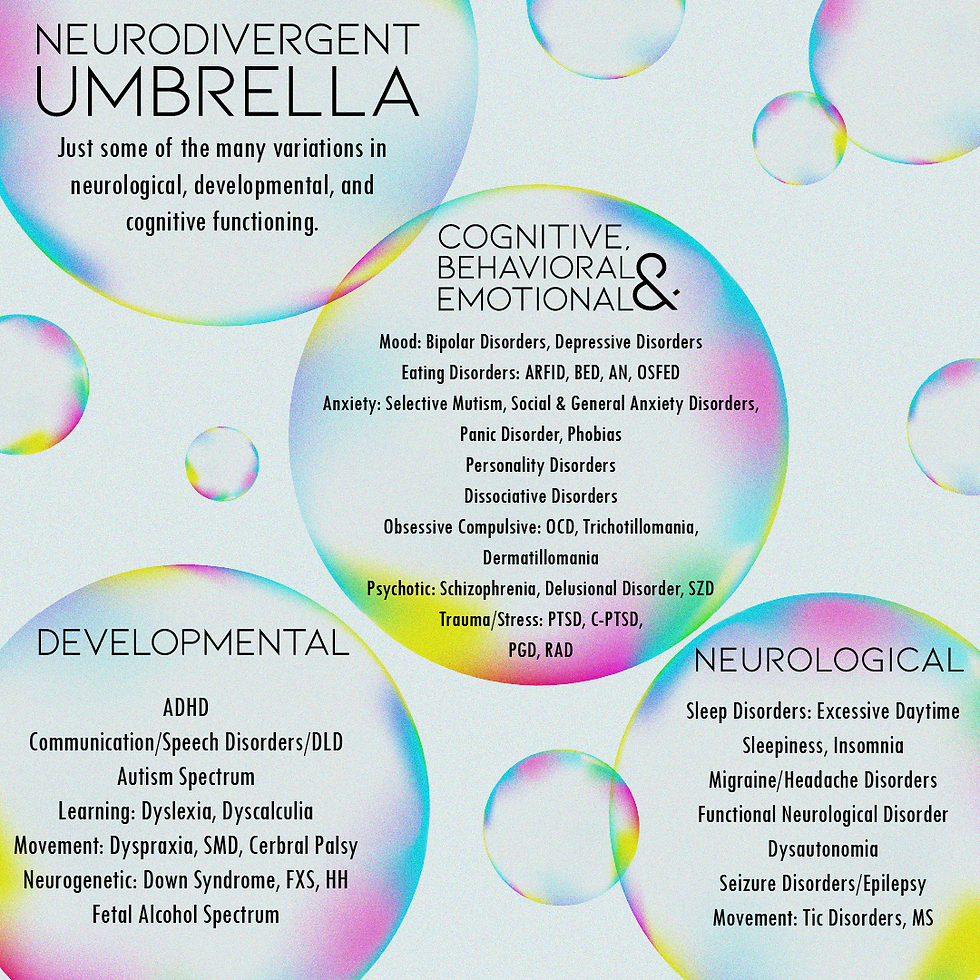I think I'm Autistic. Where do I start?
- Sam Johnson

- Jul 1, 2023
- 3 min read
Updated: Jul 6, 2023
I realized I was Autistic at around 20 years old. It's very common for people to receive an autism diagnosis later in life for many different reasons.
Getting a diagnosis is not as accessible as you may think.
The average cost of an Autism Assessment is about $2,000 or more. Many insurance companies don't cover adult autism assessments, and a lot of people don't have access to insurance that does cover it.
Autism research is mainly focused on white, male children.
So many AFAB (assigned female at birth) and people of color are not recognized as autistic in childhood. The #actuallyautistic community has been sharing its experiences with the world since 2011 to create a wider and more accurate representation of what autism truly is.
The Process of Getting Diagnosed
The process of getting an autism diagnosis as an adult starts by doing a lot of individual research and evaluation. Many people don't ever get to the final step of getting a diagnosis due to financial instability, ableism in psychiatry, and other reasons.
You don't need a diagnosis to be autistic though. The self-diagnosed Autism community is very real and very valid. I like to call myself unconfirmed Autistic rather than self-diagnosed because the label "self-diagnosed" tends to have a negative connotation in some circles.
Research and Evaluate
Start by interacting with the Autism community online to find out common characteristics, symptoms, and behaviors associated with autism.
There are also a lot of free online assessments you can take to see if you could be autistic or not. Some of these online assessments are actually used in the official diagnostic process, but be careful, because there is a lot of nuance in these tests. Many autistic people (and I agree) that some of these tests are confusing and not really accessible to autistic individuals.
Here are some of the best online assessments you can take for Autism
"The Ritvo Autism Asperger Diagnostic Scale-Revised (RAADS–R) is a self-report questionnaire designed to identify adult autistics who “escape diagnosis” due to a subclinical level presentation" (Embrace Autism).
"The AQ-10 Autism Spectrum Quotient (AQ-10) is a quick questionnaire that primary care practitioners can use to see if a person should be referred for an autism assessment."
"The Autism Spectrum Quotient (AQ) is a self-administered questionnaire used to measure autistic traits in adults (age 16+) with IQ in the normal range (IQ >=80)."
"The Camouflaging Autistic Traits Questionnaire (CAT-Q) is a self-report measure of social camouflaging behaviors in adults. It may be used to identify autistic individuals who do not currently meet diagnostic criteria due to their ability to mask their autistic proclivities."
"The Adult Repetitive Behaviors Questionnaire-2 (RBQ-2A) is a self-administered questionnaire that measures restricted and repetitive behaviors in adults."
For the Full List of Embrace Autism Tests
Once you've finished all the free assessments
and you're fairly (90-99.9%) certain that you are autistic.
Congratulations! You can now start a whole new journey of uncovering your identity, learning and adapting, and (maybe) beginning the process of getting officially diagnosed.
If you want to get diagnosed, start by talking to a therapist or psychiatrist about your research and self-evaluation, and tell them you're interested in getting assessed professionally for Autism.
When You're Looking for Someone to Diagnose You:
Ask them if they have experience working with late-diagnosed adults, and how often they diagnose adults with ASD.
Ask how they aim to support their clients once the diagnosis is complete.
Many autism assessment providers are not as open-minded or aware of adult autistics as you may hope. I once had a horrible time with an ableist provider, and I wish I had asked those questions before booking my appointment.
You are Valid With or Without a Diagnosis
In conclusion, if you think you're autistic- you're probably on to something. Even if it's not Autism specifically, there is an umbrella of neurotypes that could fit your characteristics, struggles, and strengths. It's important to always do your research and connect with other neurodivergent people in the process.




Comentários